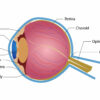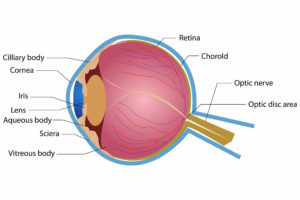
Can LASIK Eye Surgery Cure Glaucoma?
There’s a reason glaucoma has the reputation of being the “sneak thief of sight,” as the loss of vision typically occurs over a long period. And, it’s often only detected when the disease has already become quite advanced. People suffering from glaucoma, unfortunately, don’t have many options, so they may resort to laser eye surgery, like LASIK. But can LASIK eye surgery truly cure glaucoma? While some eye surgeries can aid in the treatment of glaucoma, there are safer options.
The Causes of Glaucoma
There are several reasons that you may develop glaucoma. Most commonly, it’s due to a substantial imbalance in the amount of intraocular fluid in the eye. The reason for the imbalance typically has to do with the type of disease that you have.
You can compare this disorder to the pressure in a football or basketball. The ball needs to maintain a certain pressure in order to keep its shape. Well, the same goes for your eyes. The eyeball must maintain a certain amount of intraocular pressure (IOP) with the fluid inside to maintain the globe shape. The shape of the eye is crucial for seeing clearly.
When something comes along that affects the eye’s ability to maintain its internal structure and regular IOP, the pressure can rise to dangerous levels. This excess pressure will then cause glaucoma.
If a ball or balloon becomes too inflated, it might spring a leak to relieve the excess pressure and deflate. Don’t worry though, this is not a possibility with the eye! However, as the eye pressure continues to build, it begins to push against the eye’s optic nerve. It continues until there is permanent damage to the nerve fibers and vision is obsolete.
The Eye’s Anatomy with Glaucoma
 As glaucoma progresses, the injury to your eye’s neurons will eventually lead to damage that will affect your peripheral vision. However, the first signs of the eye damage will appear in the brain. It loses connectivity with the eye. Essentially, glaucoma works in reverse, beginning in the person’s brain and then working all the way back to the retina.
As glaucoma progresses, the injury to your eye’s neurons will eventually lead to damage that will affect your peripheral vision. However, the first signs of the eye damage will appear in the brain. It loses connectivity with the eye. Essentially, glaucoma works in reverse, beginning in the person’s brain and then working all the way back to the retina.
How the Eye’s Intraocular Fluid Moves
In order to fully understand the causes of glaucoma, you should first take time to learn something about the eye’s anatomy and how the intraocular fluid actually progresses through the eyes.
- First, the ciliary body produces a clear fluid within your eyes. This is a circular structure located behind your iris, the colored part of your eye.
- The fluid is referred to as “aqueous humor” and can be found flowing behind your eye’s iris and through the pupil. The fluid fills an anterior chamber located at the rear of the cornea and the front of the eye’s iris.
- The aqueous humor then exits the eyes through the drainage angle. This is the angle that is formed between the peripheral cornea and iris and is located inside the anterior chamber.
- The fluid then filters through this angled space and then through the white portion of your eyes. It then joins the network of various veins that are outside the eye.
- If there is any disruption of the outflow of the fluid, which can result from a variety of different eye injuries, it will likely lead to an increased amount of IOP.
The draining angle is typically referred to as being open or closed, or narrow. The narrower that the angle is, the more difficult it becomes for the aqueous to flow out. However, even with an open angle, there can be flow hindrance if there is structural damage within the tissues of the actual angle.
Other Causes of Glaucoma
The main cause of glaucoma is high IOP; however, patients with normal intraocular pressure can also have the disease. This is normal-tension glaucoma. It’s caused by an extremely pressure-sensitive optic nerve, which can be easily damaged even when the IOP is normal.
While the specific cause of normal tension glaucoma is unknown, many professionals believe that it’s linked to a decrease in blood flow that goes to the eye’s optic nerve. Additionally, this poor flow of blood can come with the development of blind spots.
Glaucoma Screening and Dietary Factors
In most cases, doctors test for glaucoma by evaluating the presence of high IOP. Since this disease can occur even without a high IOP, a direct examination of the eye’s actual optic nerve is important.
Glaucoma is actually the second leading cause of blindness, coming in only after cataracts. If you catch the condition in the early stages, it is possible to slow the development with surgical or other medical means. What many people don’t know is that you can also decrease eye pressure from glaucoma. Doing so requires the incorporation of a few essential vitamins and nutrients into your daily diet.
The vitamins and minerals that you can get from foods like carrots, spinach, and kale, for example, can have extremely beneficial effects on your eyes. If it’s too hard or time-consuming to change your current diet, there are always supplemental options available. For example, our Ocu-Plus Formula, which contains the essential vitamins, nutrients, and minerals needed to combat glaucoma.
Treatment for Glaucoma
While there is no complete cure for glaucoma as of now, there are many natural ways to reduce the pressure. And, they don’t include resorting to eye surgeries like LASIK. You can save your eyesight with an early diagnosis of the disease.
Medical treatments for glaucoma will be dependent on the type of glaucoma that is present. Some treatment methods may include prescription eye drops. Others will require surgery in order to manually reduce the fluid pressure in the eye. This will help to prevent any further damage to the person’s optic nerve.
LASIK Surgery for Glaucoma
In most cases, doctors will treat glaucoma with a laser procedure. However, LASIK surgery should only be considered when the glaucoma condition has been stabilized and treated with other methods.
Any person who currently has a high IOP or who has predisposed glaucoma may not be eligible for LASIK. But, they may be able to be treated with other surgeries like LASEK, PRK, or P-IOL. The fact is, there are risks associated with any surgery, which is why we suggest alternative, natural treatments for anyone suffering from glaucoma.
It is important to have regular eye exams in order to catch the signs of glaucoma early and prevent permanent eye loss. Once vision is gone, it’s virtually impossible to get back.
Our Rebuild Your Vision Ocu-Plus Formula Contains All 17 Vitamins, Minerals, and Herbal Supplements to Improve Your Eye Health!












2 years ago I was under alot of stress and my adrenals started to act up. When this happened I was also very dizzy or off balance. Now through a naturalpath I have my adrenals under control i had my eyes tested and I was on the line of having glaucoma. i now take a eye tonic for it but could the glaucoma been the culprit for the vertigo all along?